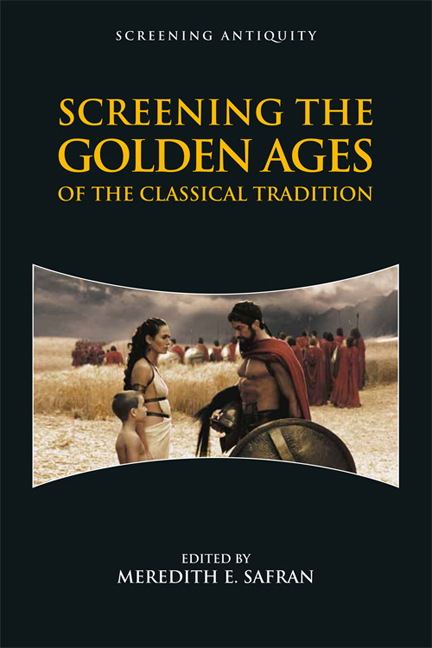Book contents
- Frontmatter
- Contents
- Series Editors’ Preface
- Editor's Acknowledgments
- Contributors
- Illustrations
- Abbreviations
- Introduction: Searching for Gold in an Age of Iron
- PART I THE GLORY THAT WAS GREECE
- 1 Re-(en)gendering Heroism: Reflective Nostalgia for Peplum's Golden Age of Heroes in Hercules: The Legendary Journeys 2.14 (1996)
- 2 Kissed by the Muse of Roller-Disco: Utopia versus the Golden Ages of America, Hollywood, and Classical Myth in Xanadu (1980)
- 3 Gilding American History through Song Culture in O Brother, Where Art Thou? (2000)
- 4 A Leonidas for the Golden Age of Superhero Films: The Thermopylae Tradition in 300 (2006)
- 5 The Dueling Greek Golden Ages of 300: Rise of an Empire (2014)
- 6 Confronting the Ancient Greek Golden Age in Jules Dassin's Phaedra (1962)
- 7 Pericles, Cincinnatus, and Zombies: Classicizing Nostalgia in The Walking Dead (2010–)
- PART II THE GRANDEUR THAT WAS ROME
- Filmography
- Bibliography
- Index
4 - A Leonidas for the Golden Age of Superhero Films: The Thermopylae Tradition in 300 (2006)
from PART I - THE GLORY THAT WAS GREECE
Published online by Cambridge University Press: 23 November 2019
- Frontmatter
- Contents
- Series Editors’ Preface
- Editor's Acknowledgments
- Contributors
- Illustrations
- Abbreviations
- Introduction: Searching for Gold in an Age of Iron
- PART I THE GLORY THAT WAS GREECE
- 1 Re-(en)gendering Heroism: Reflective Nostalgia for Peplum's Golden Age of Heroes in Hercules: The Legendary Journeys 2.14 (1996)
- 2 Kissed by the Muse of Roller-Disco: Utopia versus the Golden Ages of America, Hollywood, and Classical Myth in Xanadu (1980)
- 3 Gilding American History through Song Culture in O Brother, Where Art Thou? (2000)
- 4 A Leonidas for the Golden Age of Superhero Films: The Thermopylae Tradition in 300 (2006)
- 5 The Dueling Greek Golden Ages of 300: Rise of an Empire (2014)
- 6 Confronting the Ancient Greek Golden Age in Jules Dassin's Phaedra (1962)
- 7 Pericles, Cincinnatus, and Zombies: Classicizing Nostalgia in The Walking Dead (2010–)
- PART II THE GRANDEUR THAT WAS ROME
- Filmography
- Bibliography
- Index
Summary
Zack Snyder's 300 (2006) quickly produced three things when it premiered: unprecedented box-office success, political outrage, and scathing reviews from film and culture critics. Based on Frank Miller's 1998 graphic novel of the same name, 300 portrays the Battle of Thermopylae, in which an elite unit of 300 Spartans fought to the last man in defense of their homeland by resisting a massive Persian invasion in 480 bce. Commentators blasted its vapid dialogue, the endless parade of stylized gore, and the overall cartoonishness of the Spartans, rendered simultaneously hypermasculine and homoerotic by their oiled bodies, bulging muscles, and skimpy briefs. Above all, critics lamented 300's negative depiction of Eastern peoples: from their military inferiority to their monstrous appearance, from their slavish mentality to their polymorphous and depraved sexuality, Snyder's Persians embodied Orientalist stereotypes. The outrage over these images was enhanced by their timing, as 300 debuted in the midst of escalating tension between the United States and countries in the Middle East. The Iranian government formally denounced the movie, while Snyder infuriated many by refusing to see any contemporary links to his story of East versus West.
Although 300 undeniably is guilty of bad taste and cultural insensitivity, Snyder's blockbuster contains content worthy of serious analysis, based on its implication in three separate but related golden ages. The first is the golden age of the superhero movie, which began in the late 1990s but hit its stride in the 2000s, and within which 300's portrayal of especially Leonidas should be viewed. By relying on the superhero movie's standard narrative motifs, 300 provides its own set of viewing instructions, so that the audience may consume a movie about ancient Greek history on familiar terms. The second is the modern historiographic tradition of valorizing the Battle of Thermopylae within the grand narrative of “the West,” especially as enabling the classical, or golden, age of fifth-century bce Greece.
This consistent heroizing of Leonidas and the 300 derives from an ancient approach to recording historical events. The fifth-century Greek historian Herodotus, modernity's main ancient source for the Greco-Persian Wars, conveys the magnitude and significance of Thermopylae by comparing Leonidas and his Spartans to the legendary warriors populating Homer's epic poem the Iliad, a foundational text of Greek identity encoding cultural values and principles.
- Type
- Chapter
- Information
- Screening the Golden Ages of the Classical Tradition , pp. 83 - 100Publisher: Edinburgh University PressPrint publication year: 2018



